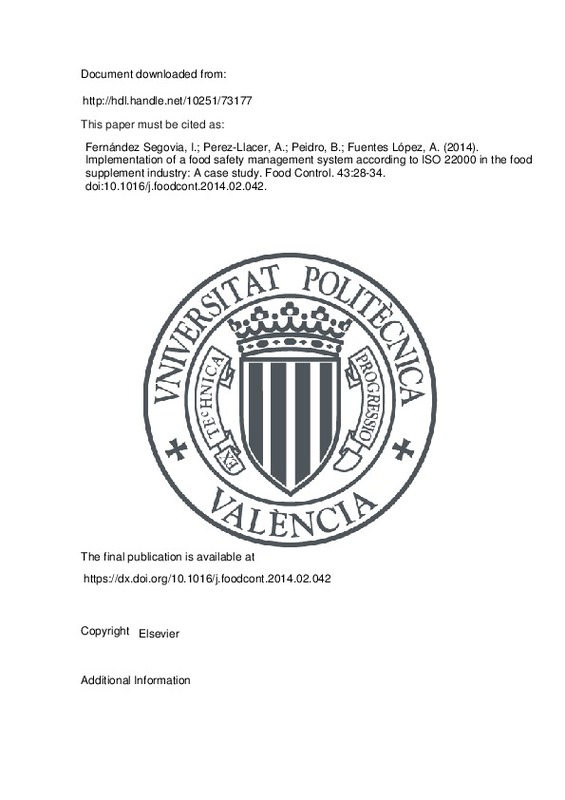JavaScript is disabled for your browser. Some features of this site may not work without it.
Buscar en RiuNet
Listar
Mi cuenta
Estadísticas
Ayuda RiuNet
Admin. UPV
Implementation of a food safety management system according to ISO 22000 in the food supplement industry: A case study
Mostrar el registro sencillo del ítem
Ficheros en el ítem
| dc.contributor.author | Fernández Segovia, Isabel
|
es_ES |
| dc.contributor.author | Perez-Llacer, Ana
|
es_ES |
| dc.contributor.author | Peidro, Begoña
|
es_ES |
| dc.contributor.author | Fuentes López, Ana
|
es_ES |
| dc.date.accessioned | 2016-11-03T08:15:32Z | |
| dc.date.available | 2016-11-03T08:15:32Z | |
| dc.date.issued | 2014-09 | |
| dc.identifier.issn | 0956-7135 | |
| dc.identifier.uri | http://hdl.handle.net/10251/73177 | |
| dc.description.abstract | [EN] This work aims to present a methodology to carry out hazard and control measures assessments to properly establish operational prerequisite programmes (oPRPs) and the HACCP plan in the food supplement industry according to the ISO 22000 standard. This study focused on the manufacture of propolis, royal jelly and vitamin C ampoules, sold as energy boosters. Seven of the 13 hazards identified in this study were significant: two hazards were in the reception step (residues of pesticides, antibiotics and/or heavy metals (code 2) and contamination by pathogens (code 3)), two in the ingredients weighing step (cross-contamination by metabisulphite (code 9) and contamination by pathogens (code 10)), one in the mixture preparation step (contamination by pathogens and/or proliferation of microorganisms (code 11)) and two in the ampoule-filling and -sealing step (cross-contamination by metabisulphite (code 12) and contamination by pathogens (code 13)). After assessing the control measures, critical control points (CCPs) were determined in the hazards with codes 2, 9 and 12, which could be managed by an HACCP plan. The remaining hazards were managed by establishing oPRPs. Implementation of the ISO 22000 standard in the food supplement industry guarantees food safety and helps improve their competitiveness in the global market. (C) 2014 Elsevier Ltd. All rights reserved. | es_ES |
| dc.language | Inglés | es_ES |
| dc.publisher | Elsevier | es_ES |
| dc.relation.ispartof | Food Control | es_ES |
| dc.rights | Reserva de todos los derechos | es_ES |
| dc.subject | Food safety | es_ES |
| dc.subject | ISO 22000 | es_ES |
| dc.subject | Food supplements | es_ES |
| dc.subject | Operational prerequisite programmes | es_ES |
| dc.subject | HACCP plan | es_ES |
| dc.subject.classification | TECNOLOGIA DE ALIMENTOS | es_ES |
| dc.title | Implementation of a food safety management system according to ISO 22000 in the food supplement industry: A case study | es_ES |
| dc.type | Artículo | es_ES |
| dc.identifier.doi | 10.1016/j.foodcont.2014.02.042 | |
| dc.rights.accessRights | Abierto | es_ES |
| dc.contributor.affiliation | Universitat Politècnica de València. Departamento de Tecnología de Alimentos - Departament de Tecnologia d'Aliments | es_ES |
| dc.description.bibliographicCitation | Fernández Segovia, I.; Perez-Llacer, A.; Peidro, B.; Fuentes López, A. (2014). Implementation of a food safety management system according to ISO 22000 in the food supplement industry: A case study. Food Control. 43:28-34. doi:10.1016/j.foodcont.2014.02.042 | es_ES |
| dc.description.accrualMethod | S | es_ES |
| dc.relation.publisherversion | https://dx.doi.org/10.1016/j.foodcont.2014.02.042 | es_ES |
| dc.description.upvformatpinicio | 28 | es_ES |
| dc.description.upvformatpfin | 34 | es_ES |
| dc.type.version | info:eu-repo/semantics/publishedVersion | es_ES |
| dc.description.volume | 43 | es_ES |
| dc.relation.senia | 277189 | es_ES |







![[Cerrado]](/themes/UPV/images/candado.png)

